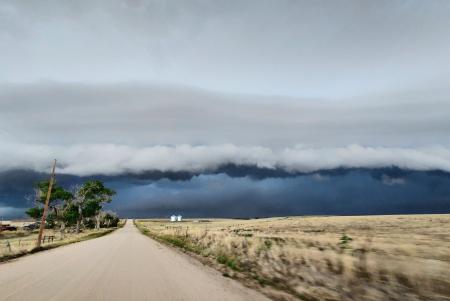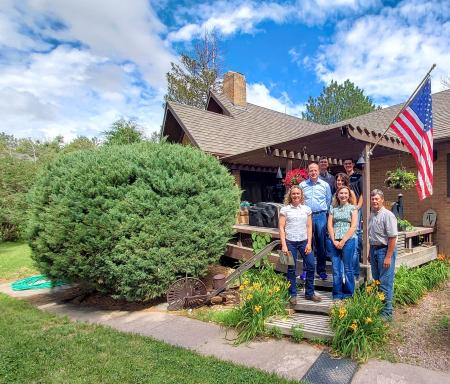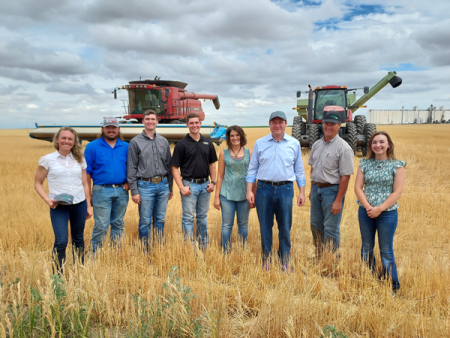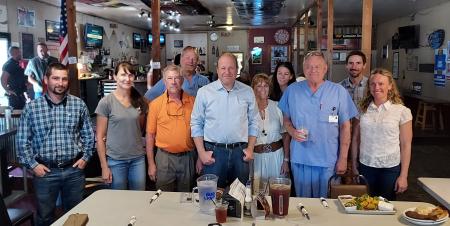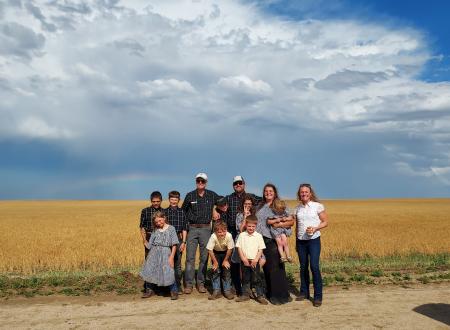Colorado’s Eastern Plains are known for bountiful agriculture and temperamental weather, and last week I experienced both as I traveled with Governor Polis along the High Plains Highway to visit with ag producers across the region.
We visited families in some of the most agriculturally productive counties in Colorado.
Together, Phillips, Yuma, Kit Carson, Cheyenne, and Lincoln counties bring in more than $1.7 billion in agricultural cash receipts per year.
Since ag is central to the Plains’ economy, it has its fair share of challenges facing the industry.
Drought, labor challenges, and rising input costs have deeply affected farmers and ranchers across our state.
Climate change is making our environment drier and our weather more unpredictable while water from all sources -- precipitation, snowmelt, or aquifer -- is becoming scarcer.
These challenges are impacting how producers run their operations and how they provide for their families now and in the future.
To Colorado farmers and ranchers, challenges are nothing new. At every stop, we saw families and communities coming together to take care of the land as well as their neighbors.
At our stop to visit the Vision Angus operation in Amherst, we met the Vieselmeyer family, who raise Angus cattle and farm non-irrigated land to produce wheat, millet, grass and corn for silage. They've been on their land for four generations and the family is committed to no-till farming practices that help enhance soil quality and retain more moisture in the ground. We joined them for wheat harvest and talked about how to support their sons and other young people in their community who want to pursue agriculture as a career.
Vision Angus is a grant recipient of CDA’s Agricultural Workforce Development Program, which helps ag businesses cover the costs of an intern or apprentice while providing an opportunity for young farmers to gain on site experience. The Vieselmeyers, whose sons Austin and Alex work on the ranch, would like to continue bringing in local help during the summers. This years’ apprentice, Theron, wants to pursue a career in welding and use those skills in agriculture. Their family has been actively involved in the local 4-H and FFA chapters and want to continue working with young people in their community who will continue the tradition of feeding our state.
On our way along the High Plains Highway, we also stopped by the South Republican State Wildlife Area, where the former Bonny Reservoir used to bring in tourists and locals alike for recreation and relaxation. We were met there by members of the Republican River Water Conservation District and staff from the Department of Natural Resources. We recently worked with the district and other water leaders this year to secure $60 million in American Rescue Plan Act dollars to be split between the Republican and Rio Grande basins for voluntary water conservation. This funding will help producers meet interstate compact obligations and support aquifer recovery and sustainability through voluntary, incentive-based approaches.
We then headed to Cheyenne Wells to meet for lunch and a chat with producers and Cheyenne Conservation District members at the local watering hole. About a dozen of us sat around a table, discussing the needs of this agricultural community. We know funding for expanding regenerative ag practices is needed, but so is funding for housing and mental health support or support for a local grocery operator to stay in business. It’s conversations like these in the field that help shape CDA’s priorities at the policy level and with on the ground programs like our partnerships with rural mental health providers and our upcoming local food assistance program.
As we crossed the plains back toward the west, we were greeted by a supercell thunderstorm cloud bringing some much needed moisture to the plains. But even the precipitation out here requires a hardy constitution to withstand - with the rain came hail and tornado warnings.
As we traveled through Lincoln and Elbert counties, we visited two recipients of the Colorado Proud processing grants. These grants, funded with state stimulus recovery dollars, helped Colorado based agricultural businesses invest in expanding market channels and increasing production. In total, 41 different companies received more than $370,000 for marketing and technical assistance.
Our first stop was near Hugo where we met the Poss family, who run Grains from the Plains and Sunflower Acres Farm, producing varieties of wheat and millet and raising pasture pork and grassfed beef. The whole family works on the farm, including the Poss’s seven kids who help out however they can. We were treated to cookies, scones and other delicacies prepared with the grains grown right there. We also talked to other community members who joined us for the stop about the barriers that prevent fresh food grown in Lincoln County from reaching its own community. Local solutions, including the Southern Colorado Virtual Farmers market that connects local producers with members of their own communities, are fantastic examples of this community’s determination to overcome challenges.
Our final stop was at Cleantec Mushroom Facility, run and operated by Michael Ring, whose creativity and inventiveness led him to rehabilitate old tractor trailers into self-sustaining greenhouses and mushroom growing facilities. In addition to repurposing retired semi trailers into food production environments, Michael is using his skills and interest in things like renewable energy to create and test new forms of sustainable growing environments.
Throughout the day, we met with people from all walks of life about what it’s like to call the Eastern Plains home. On all our stops, we spoke with folks who are deeply committed to supporting their communities in a variety of ways: through stewardship practices that will help create resilience to a changing climate, by giving new and beginning farmers an opportunity to gain experience, and by finding innovative ways to expand market opportunities and sales channels to benefit the bottom line of their operations.
We took back with us a little of their determination to keep finding solutions that are creative, multi-beneficial, and work for individual operations. I am grateful to all the farmers, ranchers, elected officials, and other local leaders who so generously hosted Governor Polis, me and my team on this trip. We are always glad to share in the obvious pride for the place you call home.
